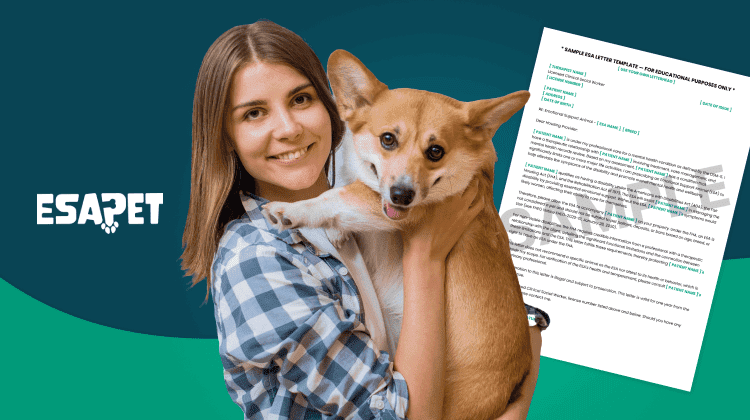What Is a Psychiatric Service Dog Letter? How to Get One?

A PSD letter is a key to accessing legal protections. If you rely on a service dog for mental health support, this letter allows you to live, travel, and go about daily life with your dog. In this guide, we’ll walk you through how to get a PSD letter and explain its benefits.
What is a Psychiatric Service Dog (PSD) Letter?
A PSD letter is a document from a licensed mental health professional. It confirms that the individual has a mental condition and needs a trained service dog. These dogs help by doing specific tasks to support their owner’s daily needs.
Unlike an emotional support animal (ESA) letter, a PSD letter is for dogs trained to perform tasks. Emotional support animals don’t need special training. With a PSD letter, you get legal access to places where animals are allowed.
Who Qualifies for a PSD Letter?
People who already have a trained dog and live with a mental health disability can qualify for a PSD Letter. This could include individuals living with PTSD, anxiety, or depression. These conditions must impact your major life activities.
An LMHP must confirm you have a qualifying disability. They’ll assess whether a PSD is necessary for your daily life. The dog will need to perform disability-related tasks. These include calming anxiety attacks or reminding you to take medication.
How to Get a Psychiatric Service Dog Letter
Obtaining a PSD letter involves several steps to ensure the dog and handler meet specific requirements. This letter is crucial for recognizing your PSD as a legitimate support animal. It provides you access to legal rights and accommodations.
The first step is training your dog to perform specific tasks that improve your mental condition. Once the dog is fully trained, you need to complete a questionnaire to see if you qualify for a PSD letter. This process helps ensure that a PSD is an appropriate option for you.
After pre-screening, you’ll have a consultation with a licensed mental health professional. You can receive a signed PSD letter quickly, often within three business days if approved. It allows you to access the benefits and rights provided to psychiatric service dog handlers.
Step 1: Service Dog Training
Your psychiatric service dog (PSD) must be properly trained. PSDs perform specific tasks for individuals with mental health disabilities. They may remind their owners to take medication or provide comfort during anxiety attacks. Proper training is essential for a PSD to help effectively.
Step 2: Pre-Screening Questionnaire
Step 2: Pre-Screening Questionnaire
After the training, you need to complete a pre-screening questionnaire to get a PSD letter. This questionnaire helps assess your mental condition and daily challenges. It determines if a PSD is a suitable solution for your needs. This process ensures only those who qualify move forward.
Step 3: Consultation with a Licensed Mental Health Professional
After the pre-screening, you will need to meet with an LMHP. They will test your mental health disability and determine if you need a PSD. Their professional judgment is crucial in approving your need for a service dog to assist with daily tasks.
Step 4: Receive a Signed PSD Letter Within 48 Hours
Once approved, you can receive your signed PSD letter within three business days. This letter serves as legal proof that you need a psychiatric service dog. It grants access to housing, flights, and other areas where service animals are permitted. The process is quick and straightforward.
Service Dog Letter Online
You can get a Service Dog Letter online through legitimate providers. Ensure that the provider connects you with a licensed professional. The letter must meet legal requirements for service animals. It should also provide the access and protection you need for your PSD.
Self-Training vs. Professional Service Animal Training
Self-training a PSD can be cost-effective and personal. You can focus on your specific needs. It requires significant time and effort. However, professional training ensures the dog is well-prepared to perform disability-related tasks. It also guarantees consistent results.
Professional training can be expensive but comes with the assurance that your dog is fully qualified. Service animals must be capable of reliably performing tasks related to their handler’s psychiatric disabilities. This makes professional training a more dependable option.
Who Can Write a PSD Letter?
A PSD letter must come from a licensed healthcare professional. This includes therapists, psychologists, and psychiatrists. These professionals have the qualifications to assess mental health conditions. Any medical professional who evaluates your condition can issue a PSD letter.
Components of a Legitimate PSD Letter
A legitimate PSD letter must contain specific details to be valid. This letter confirms that the individual has a mental condition and requires a PSD to assist with their daily life. Ensuring the letter includes all the necessary components is vital for legal recognition.
A proper PSD letter includes the professional’s information, the patient’s diagnosis, and how the service dog supports the individual’s mental health needs. The letter must also feature official letterhead and a signature to confirm its authenticity.
Licensed Mental Health Professional Information
The letter must include the mental health professional’s full name, contact details, and license number. This ensures that a qualified healthcare professional issues the letter. It also verifies that the provider can legally write a PSD letter.
Patient’s Information and Diagnosis
The letter must provide basic information about the patient. It should include the patient’s name and confirm the diagnosis of their mental health condition. While specific details are not always necessary, the diagnosis must align with the need for a psychiatric service dog.
Role of the Psychiatric Service Dogs
The letter should clearly explain the role of the psychiatric service dog. It must describe how the dog will assist the patient by performing tasks related to their mental health. This connection between the dog and the patient’s needs is essential for the letter’s validity.
Official Letterhead and Signature
A legitimate PSD letter must be on official letterhead from the mental health professional’s practice. The letter also requires a valid signature from the provider. Without these, the letter may not be accepted as official documentation.
Psychiatric Service Dog Letter Template
A standard PSD letter template includes key elements for legitimacy. It must feature the licensed mental health professional’s information, the patient’s diagnosis, and the role of the service dog. It should have an official letterhead and a signature to ensure legal acceptance.
Do PSD Letters Expire?
Yes. PSD letters typically expire after one year. To maintain legal protections, you need to renew the letter annually. This ensures that your need for a PSD is still valid. A renewed letter helps keep your housing, travel, and public access rights intact.
Benefits of Having a PSD Letter
A PSD letter provides benefits that make living easier for individuals with mental conditions. It serves as official documentation, granting the handler specific rights. It ensures that their service dog is legally recognized in various situations.
A PSD letter opens doors to support, accommodations, and a better quality of life. Some key benefits include housing rights under the FHA, public access rights through the ADA, and travel rights under the ACAA.
- Housing Rights
A Service Dog Letter for housing provides housing protections under the Fair Housing Act (FHA). It allows individuals to live with their service dogs, even in no-pet housing. A housing provider must grant reasonable accommodation, ensuring they can keep their service dog without issues. - Public Access Rights
With a PSD letter, individuals gain public access rights under the Americans with Disabilities Act (ADA). This means PSDs can accompany their handlers in public spaces. The PSD helps individuals manage their disability by performing tasks, and they cannot be denied entry. - Travel Rights
A PSD letter ensures travel rights under the Air Carrier Access Act (ACAA). This law allows individuals to travel with their PSDs without paying extra fees. Airlines must provide reasonable accommodation for the dog, making travel easier for those with disabilities.
Legal Rights and Protections for Psychiatric Service Dog Owners
Several important laws protect PSD owners. The ADA allows them to bring their service dogs into public places. This includes stores, restaurants, and other spaces. The dog must be trained to perform tasks directly related to the person’s disability.
Under the FHA, landlords must allow psychiatric service dogs, even in no-pet housing. The ACAA ensures people can travel with their assistance animals without extra fees. These laws provide vital protections for those who rely on service dogs for daily support.
Who Qualifies for a Psychiatric Service Dog?
Individuals with certain mental health conditions may qualify for a PSD. These conditions include PTSD, anxiety, depression, and other psychiatric disorders. The condition must be a physical or mental impairment that substantially limits one or more major life activities.
A medical professional must diagnose the individual to qualify for a psychiatric service dog. This professional will confirm the need for an assistance animal. The dog is trained to perform specific tasks related to the person’s condition. It provides crucial support for their daily life.
Psychiatric Service Dog Training
Psychiatric service dogs must undergo specialized training. This training focuses on task-based skills that help manage the handler’s psychiatric condition. Tasks may include interrupting panic attacks, providing grounding during anxiety, or reminding to take medication.
Learn More about Psychiatric Service Dog Training
Frequently Asked Questions About Psychiatric Service Dog Letters
What Is a Psychiatric Service Dog Letter?
A PSD Letter is a document from a licensed professional. It confirms you need a psychiatric service dog for your mental health condition.
What Does a Psychiatric Service Dog Letter Say?
The letter confirms the handler’s mental health condition and the need for a psychiatric service dog. It also includes the licensed professional’s name, contact information, and license number.
How Do You Ask Your Doctor for a Psychiatric Service Dog Letter?
Tell your doctor how your mental health condition affects your daily life. Share how a service dog could help you manage your symptoms. Your doctor will evaluate your needs and determine if a service dog is necessary.
Can a Psychologist Write a Letter for a Service Dog?
Yes. A psychologist can write a letter for a psychiatric service dog. They are licensed healthcare professionals who can assess your mental health condition.
Wrapping Up: What Are Psychiatric Service Dogs Letters?
Obtaining a PSD letter involves consulting an LMHP who can confirm your need for a service dog. Once you have the letter, you will get legal protections for housing, public access, and travel. If you think a PSD could improve your life, consult a professional and take the next step forward.





